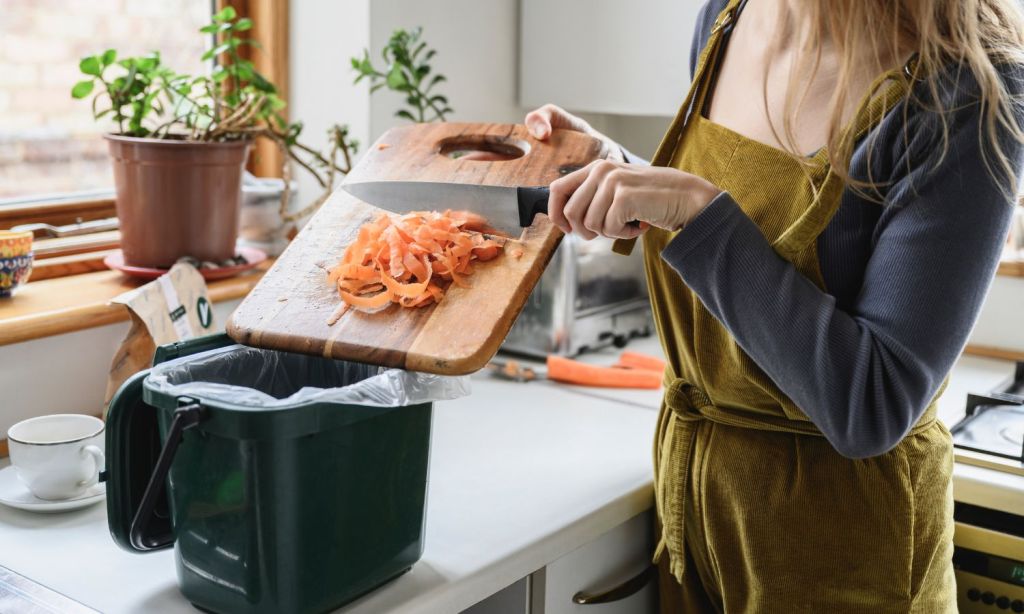The Latch has partnered with Suncorp Bank to deliver sustainability content that helps our readers drive positive action in their everyday lives.
When it comes to creating a low (or no) waste home, composting is a great place to start. Not only is it a sustainable means of discarding kitchen waste and thus avoiding sending it to landfill, but it’s also one of the easiest ways to keep your garden healthy without the use of fertilisers.
But while composting may seem like the solution to getting rid of all kinds of waste in your home, there are some parameters around what can and cannot go in the bin. Many a compost bin has been foiled by an overzealous user who threw in items that aren’t conducive to breaking down, and ahead, we outline five common household scraps to avoid putting in the compost bin so that it doesn’t happen to you.
Dairy and Animal Fats
Dairy products like cheese, butter, yoghurt and sour cream can technically be composted, though due to their high fat content, they often don’t react well to the natural water produced during the composting process. One of the big reasons for this is the moisture they create when breaking down, which can disrupt the pH of the compost and create unwanted smells.
This may be counteracted by increasing the dry brown matter (like dry leaves, for example) to soak up the moisture, though avoiding them altogether if you’re new to composting is probably easier. Additionally, these food products are sticky and likely to gel with other elements in the compost bin, which could end up attracting more pests.
Pet Poop
Although logically, poop from animals like cows, chickens and horses is often used as fertilisers, pet poop is a different story. Pets are usually fed dry or wet food that may not be ingested well and result in waste that cannot be broken down. Furthermore, their stools may contain parasites or bacteria that are not healthy for the composting process. Our advice is to just avoid it.
Fish and Meat Scraps
Theoretically, fish and meat scraps are completely compostable. However, the reason we suggest against putting them in your compost bin is that they take a lot of time to decompose — far longer than fruit and veggie scraps. During the decomposition process, the smell often attracts pests like cockroaches and flies, which could be very problematic and disruptive to the overall health of your compost bin.
Particularly if you live in an apartment, and your compost bin sits on your countertop, we suggest you leave meat scraps and any kind of processed meat out of the compost bin.
Coal and Ash
Particularly in the winter, you may be left with extra coal and ash from your barbeque or bonfire and think it’s appropriate to put in your compost. Unfortunately, coal or leftover ash is too acidic for your compost pile and will tip the balance of your compost in the wrong direction. We suggest waiting until you have sufficient brown and green elements in your compost pile, and even then, only add a little bit of wood fire ash.
Tea and Coffee Bags
Tea leaves and coffee grounds certainly belong in the compost, but the bags that carry them do not. This is because most tea and coffee bags contain some amount of nylon or synthetic fibres that are not biodegradable. Although these have not proven to be dangerous for consumption when mixed with hot water, they cannot break down easily with other items in the compost bin.
Ideally, use loose tea leaves in cotton or hemp pouches or ground fresh coffee each time you use them in the kitchen to reduce your plastic waste and, that way, every part of the tea and coffee can be thrown into the compost.
This list is not exhaustive. However, the general rule of thumb for composting is that if you could identify that everything going into your compost originates from a natural source, to be on the safe side. if you cannot identify what makes up the product, skip putting it into the bin and read up to find out more about what it is and how it can be treated.
Read more stories from The Latch and subscribe to our email newsletter.
Any representations, views or opinions contained in this article are those of The Latch and do not reflect those of and are not endorsed by Suncorp Bank.







